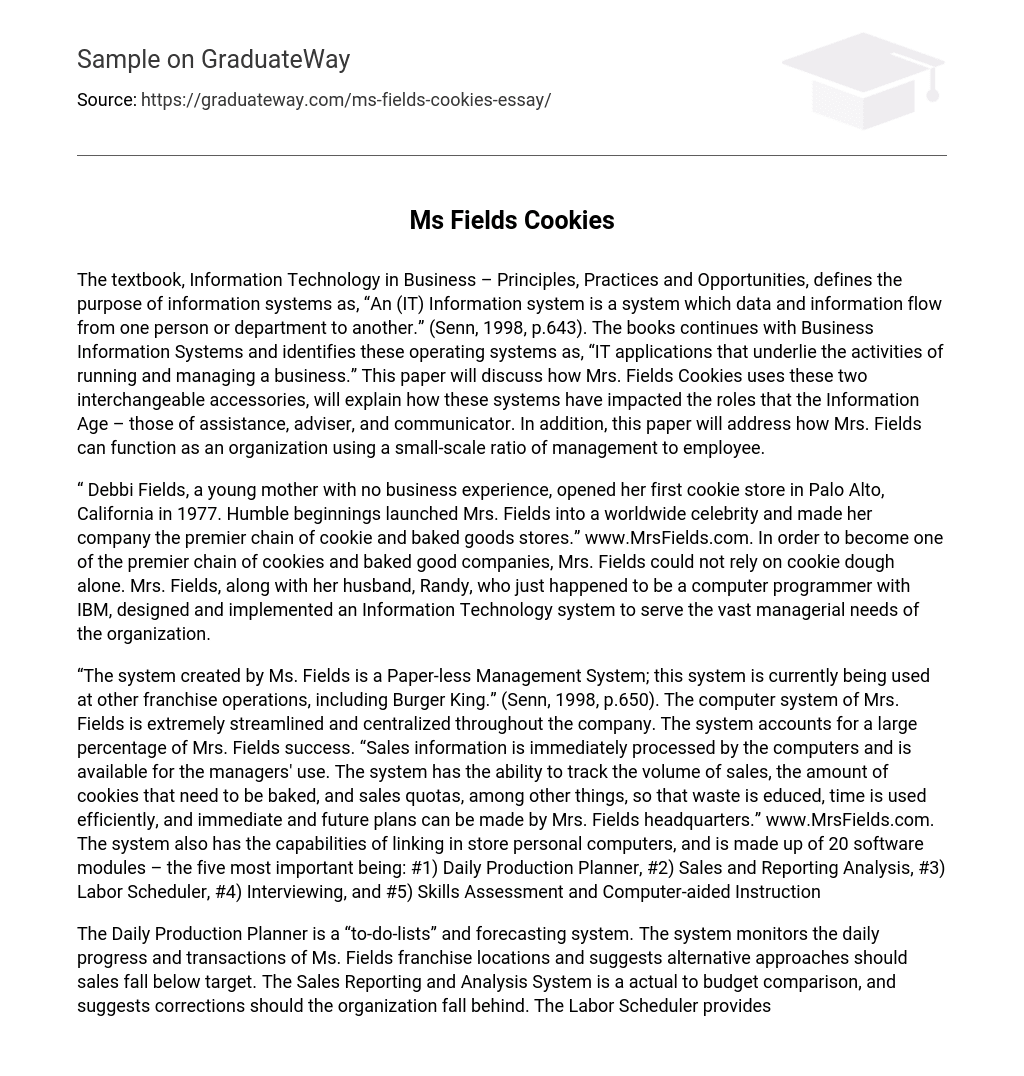According to the textbook, Information Technology in Business – Principles, Practices and Opportunities, the purpose of information systems is defined as a system where data and information flow between individuals or departments (Senn, 1998, p.643). Additionally, the book discusses Business Information Systems as IT applications that support business operations. This paper will explore how Mrs. Fields Cookies utilizes both of these interchangeable components and examine the impact on the Information Age roles of assistance, adviser, and communicator. Furthermore, the paper will address how Mrs. Fields can operate as an organization using a small-scale management to employee ratio.
Debbi Fields, a young mother with no business experience, opened her first cookie store in Palo Alto, California in 1977. Starting from humble beginnings, Mrs. Fields became a worldwide celebrity and her company emerged as the leading chain of cookie and baked goods stores (source). To establish itself as a premier player in the industry, Mrs. Fields realized that her success couldn’t rely solely on cookie dough. In collaboration with her husband Randy, who coincidentally was a computer programmer at IBM, they developed and implemented an Information Technology system to efficiently handle the extensive managerial requirements of the organization.
The Paper-less Management System created by Ms. Fields is currently being used at other franchise operations, such as Burger King (Senn, 1998, p.650). This streamlined and centralized computer system plays a significant role in Mrs. Fields’ success. It quickly processes sales information and provides managers with immediate access. The system tracks sales volume, cookie production needs, and sales quotas, contributing to waste reduction, efficient time utilization, and the ability to make immediate and future plans at Mrs. Fields headquarters (www.MrsFields.com). Additionally, the system allows for the integration of in-store personal computers and consists of 20 software modules. The five most important modules are the Daily Production Planner, Sales and Reporting Analysis, Labor Scheduler, Interviewing, and Skills Assessment and Computer-aided Instruction.
The Daily Production Planner is a system for creating “to-do-lists” and forecasting. It monitors the daily progress and transactions of Ms. Fields franchise locations and offers suggestions if sales fall below target. The Sales Reporting and Analysis System compares actual sales to the budget and provides suggestions for correction if the organization falls behind. The Labor Scheduler creates employee work schedules, minimizing overtime and maximizing alternative schedules. The Interviewing System ensures unbiased ½ hour interviews for all applicants of Mrs. Fields. Lastly, the Skills Assessment and Computer Aided Instruction Program identifies employee weaknesses and provides corrective training. All of these systems, combined with Ms. Fields’ management techniques, contribute to the organization’s success.
The Managers of Mrs. Fields have more time to manage the operational efficiency of the company and its employees due to being freed from paperwork constraints. With 5,000 employees in 700 stores and only 130 headquarter employees, this allows for maximum production of freshly baked cookies and minimal waste. The use of a system like the Paper-less Management System enables companies to operate in a more flat-lined organization, providing a stronger grasp on operations.
The saying that supports Debbie Fields is “One Smart Cookie,” which details how she and her husband Randy built their cookie empire.
Senn, James, A., Information Technology in Business — Principles, Practices, and Opportunities, Prentice Hall Publishing, New Jersey, 1998.





